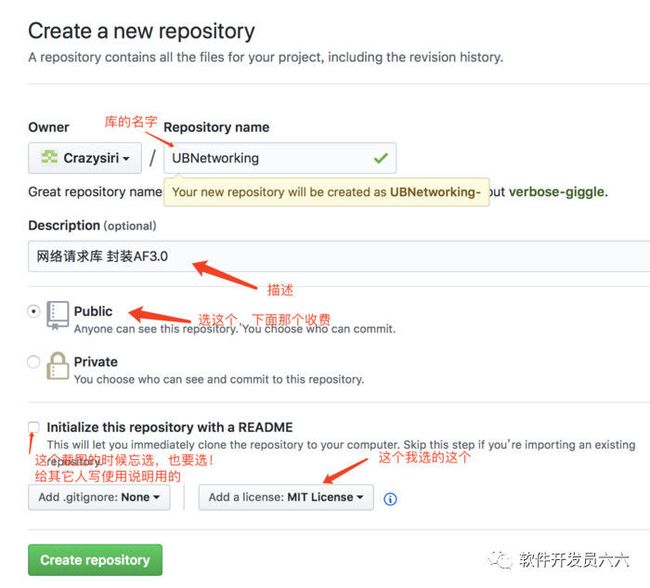现在大家都在推进模块化,每次粘贴拷贝烦了,我也搞个模块化,因为公司要新起项目,我想我不能每一次都来粘贴一次这么多的基础库文件,我直接模块化出来好了,每次要用pod下就好了,还可以持续更新。
首先我们来说下这样做的好处,特别是多人开发的时候,这样是特别方便的,还有就是代码干净,工程里只有业务代码,然后业务代码再根据功能进行模块,我这里还没弄,项目不大不太需要。主要是在大工程这样的好处更大,清晰,问题好定位,代码干净解耦,同时也锻炼你的抽象能力吧。
这次我抽象出来的项目叫“KZWFoundation”,其中包含了基础控件的统一风格封装,基础网络框架的封装(对af 3.0的再次封装)包含加密验签,router,基础controller,通用控件视图,基础宏,和一些基础category的封装。
下面说下,怎么创建自己的cocospod库:
1、将你需要的文件和demo项目创建在github:
第一步,创建.png
这里借用了James大叔的图,人懒就不重复截图了。
2、说下共享吧:
pod spec create KZWFoundation
编辑.podspec:
#
# Be sure to run `pod spec lint KZWFoundation.podspec' to ensure this is a
# valid spec and to remove all comments including this before submitting the spec.
#
# To learn more about Podspec attributes see http://docs.cocoapods.org/specification.html
# To see working Podspecs in the CocoaPods repo see https://github.com/CocoaPods/Specs/
#
Pod::Spec.new do |s|
# ――― Spec Metadata ―――――――――――――――――――――――――――――――――――――――――――――――――――――――――― #
#
# These will help people to find your library, and whilst it
# can feel like a chore to fill in it's definitely to your advantage. The
# summary should be tweet-length, and the description more in depth.
#
s.name = "KZWFoundation"
s.version = "1.1.0"
s.summary = "iOS 基本库"
# This description is used to generate tags and improve search results.
# * Think: What does it do? Why did you write it? What is the focus?
# * Try to keep it short, snappy and to the point.
# * Write the description between the DESC delimiters below.
# * Finally, don't worry about the indent, CocoaPods strips it!
s.description = <<-DESC
iOS基本库
DESC
s.homepage = "https://github.com/ouyrp/KZWFoundation"
# s.screenshots = "www.example.com/screenshots_1.gif", "www.example.com/screenshots_2.gif"
# ――― Spec License ――――――――――――――――――――――――――――――――――――――――――――――――――――――――――― #
#
# Licensing your code is important. See http://choosealicense.com for more info.
# CocoaPods will detect a license file if there is a named LICENSE*
# Popular ones are 'MIT', 'BSD' and 'Apache License, Version 2.0'.
#
s.license = "MIT"
# s.license = { :type => "MIT", :file => "FILE_LICENSE" }
# ――― Author Metadata ――――――――――――――――――――――――――――――――――――――――――――――――――――――――― #
#
# Specify the authors of the library, with email addresses. Email addresses
# of the authors are extracted from the SCM log. E.g. $ git log. CocoaPods also
# accepts just a name if you'd rather not provide an email address.
#
# Specify a social_media_url where others can refer to, for example a twitter
# profile URL.
#
s.author = { "ouyang" => "[email protected]" }
# Or just: s.author = "ouyang"
# s.authors = { "ouyang" => "[email protected]" }
# s.social_media_url = "http://twitter.com/ouyang"
# ――― Platform Specifics ――――――――――――――――――――――――――――――――――――――――――――――――――――――― #
#
# If this Pod runs only on iOS or OS X, then specify the platform and
# the deployment target. You can optionally include the target after the platform.
#
# s.platform = :ios
s.platform = :ios, "8.0"
# When using multiple platforms
# s.ios.deployment_target = "5.0"
# s.osx.deployment_target = "10.7"
# s.watchos.deployment_target = "2.0"
# s.tvos.deployment_target = "9.0"
# ――― Source Location ―――――――――――――――――――――――――――――――――――――――――――――――――――――――――― #
#
# Specify the location from where the source should be retrieved.
# Supports git, hg, bzr, svn and HTTP.
#
s.source = { :git => "https://github.com/ouyrp/KZWFoundation.git", :tag => "#{s.version}" }
# ――― Source Code ―――――――――――――――――――――――――――――――――――――――――――――――――――――――――――――― #
#
# CocoaPods is smart about how it includes source code. For source files
# giving a folder will include any swift, h, m, mm, c & cpp files.
# For header files it will include any header in the folder.
# Not including the public_header_files will make all headers public.
#
s.source_files = "Classes/KZWFoundationHear.h"
s.subspec 'Content' do |ss|
ss.source_files = 'Classes/**/*.{h,m}'
ss.exclude_files = "Classes/KZWFoundationHear.h"
ss.framework = "MapKit"
end
# s.public_header_files = "Classes/**/*.h"
# ――― Resources ―――――――――――――――――――――――――――――――――――――――――――――――――――――――――――――――― #
#
# A list of resources included with the Pod. These are copied into the
# target bundle with a build phase script. Anything else will be cleaned.
# You can preserve files from being cleaned, please don't preserve
# non-essential files like tests, examples and documentation.
#
# s.resource = "Classes/Rseouce/KZWFundation.bundle"
# s.resource_bundle = "Classes/Rseouce/KZWFundation.bundle"
s.resource_bundle = { 'KZWFundation' => ['Classes/Rseouce/KZWFundation.bundle'] }
# s.resources = "Resources/*.png"
# s.preserve_paths = "FilesToSave", "MoreFilesToSave"
# ――― Project Linking ―――――――――――――――――――――――――――――――――――――――――――――――――――――――――― #
#
# Link your library with frameworks, or libraries. Libraries do not include
# the lib prefix of their name.
#
# s.frameworks = "SomeFramework", "AnotherFramework"
# s.library = "iconv"
# s.libraries = "iconv", "xml2"
# ――― Project Settings ――――――――――――――――――――――――――――――――――――――――――――――――――――――――― #
#
# If your library depends on compiler flags you can set them in the xcconfig hash
# where they will only apply to your library. If you depend on other Podspecs
# you can include multiple dependencies to ensure it works.
# s.requires_arc = true
# s.xcconfig = { "HEADER_SEARCH_PATHS" => "$(SDKROOT)/usr/include/libxml2" }
s.dependency "Masonry"
s.dependency "MJRefresh"
s.dependency "AFNetworking"
s.dependency "Mantle"
s.dependency "MBProgressHUD"
s.dependency "SAMKeychain"
end
这里重点说下,遇到的坑,s.source_files这个说的是你要共享的文件的位置,和你在创建之后的文件没任何关系, s.subspec这个才是创建文件夹如果你没有就是默认没有文件夹,文件都在你的库下面,这样会很丑很难看,很不优雅,然后s.subspec这个里面也是一个cocospod所以你需要把你用到的都加上,然后我们说下资源文件,我们都是优雅的人所以我们肯定不能丢各种png文件对不对,所以我们需要创建bundle,然后配置是s.resource_bundle = { 'KZWFundation' => ['Classes/Rseouce/KZWFundation.bundle'] }这个浪费我一个下午,所以大家需要看下其他的比较大的库是怎么配的不用走弯路。
3、然后是验证
1
pod lib lint KZWFoundation.podspec --verbose --use-libraries --allow-warnings
这个是验证本地,最好是先跑下这个,没问题在提交然后验证远程,开始我没这么做一个天提交了10个版本,被自己蠢死了。
4、提交
git add -A && git commit -m "version 1.0.0"
git tag '1.0.0' //和上面.podspec一致
git push --tags
git push origin master
5、验证远程的
1
pod spec lint KZWFoundation.podspec --verbose --use-libraries --allow-warnings
6、没问题了之后提交
pod trunk register *****@xx.com "ouyang"
pod trunk push KZWFoundation.podspec --use-libraries --allow-warnings
如果trunk注册过了可以跳过注册直接推就好了,成功后就会让你告诉你的朋友了,这样就完成了,然后你就可以pod下来了,完美。然后你在改的话,就要升版本,改一次升一次版本。
